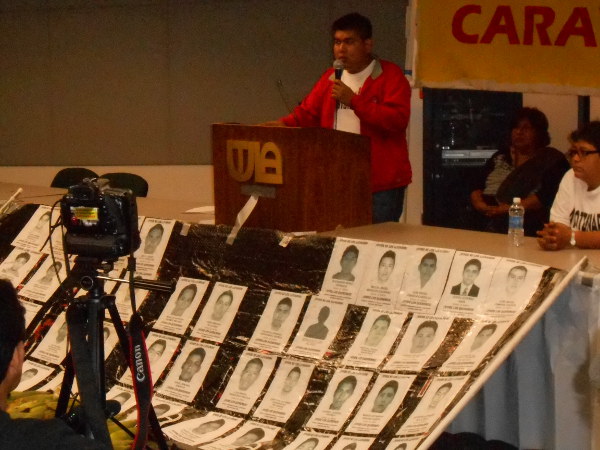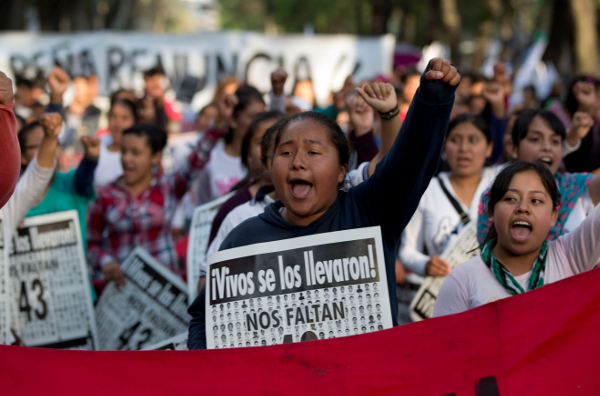Interview with Massacre Survivor:
Caravana 43 Brings Ayotzinapa Students’ Struggle to U.S.
March 30, 2015 | Revolution Newspaper | revcom.us
Revolution Interview
A special feature of Revolution to acquaint our readers with the views of
significant figures in art, theater, music and literature, science, sports and politics. The views expressed by those we interview are, of course, their own; and they are not responsible for the views published elsewhere in our paper.
On March 20, Revolution spoke with Ángel Neri de la Cruz, a survivor of the Mexican government assault on September 26, 2014, on students from the Ayotzinapa rural teacher training college in the southern Mexican state of Guerrero. That attack killed six people, and 43 students have been disappeared up to this day.
 Ángel Neri de la Cruz, a student who survived the massacre, speaking at a caravan stop in Los Angeles. Photo: Special to revcom.us
Ángel Neri de la Cruz, a student who survived the massacre, speaking at a caravan stop in Los Angeles. Photo: Special to revcom.us
Before our interview with Ángel, he had given a talk to teachers in Los Angeles and described how police and soldiers had attacked and shot up three buses of 150 students from the school. The students were returning from raising funds to go to the annual commemoration of the 1968 massacre of students by troops and police in Mexico City. One student was killed right next to Ángel, and 25 were wounded.
Since the September attack, these murders and disappearances by the state have given rise to wave upon wave of outrage and protest throughout Mexico and other parts of the world.
As part of the struggle of the students and their supporters, caravans have been organized in the United States. Ángel, another survivor, and some parents of the 43 disappeared are on three caravans—known as Caravana 43—to get the word out about their struggle, with stops in some 40 major U.S. cities. The caravans will meet up in Washington, DC, and then go to the United Nations in New York City.
(For more on the recent struggles in Mexico, see “Mexico: ‘The Straw That Broke the Camel’s Back’.”)
 Demonstration in Mexico City in February 2015, with posters saying, "You took them alive, return them alive!" AP photo
Demonstration in Mexico City in February 2015, with posters saying, "You took them alive, return them alive!" AP photo
Revolution: Through this struggle, what have you learned about the role of the Mexican state, and also the U.S. state?
Ángel Neri de la Cruz: Look, prior to September 26, as students we knew that the state was repressive, that it is a criminal state. But having witnessed this attack by the police, by the army, we realized that they, therefore, are not going to stop at anything, because after what happened, there was so much repression by that same state. They even beat a teacher to death in Acapulco on February 24. And there you see this project where they use means to supposedly combat drug trafficking. But they don’t use them for this reason. They use them to suppress all demonstrations, to kill students and everything else. This is what we have learned. We learned that the United States supports the Mexican state. But we come to say we do not support it.
Revolution: Why does the U.S. government support the government of Mexico?
Ángel: For their own benefit. You well know that it grabs the natural resources of our country, not only in our country but in other countries throughout Latin America, and across the world as well. They are not only interested in Mexico...
Revolution: For you all, what is the next step to continue insisting in this struggle, to expand it, spread it more?
Ángel: First, to visit the international institutions like the United Nations, for example, and the Inter-American Court [of Human Rights]. And from there exert international pressure, because our country, in fact, is going to ignore us. So we ask for support, from what is called the world’s most powerful country, so that it demands from our country a resolution for our case.
Revolution: We who live in the U.S. know that the U.S. government is horrible. It kills people too. In the U.S., the cops kill and repress. But they do it with deception. What’s going to be needed to force them to support you?
Ángel: People know, just sometimes because of their comfort space, because they don’t want to get involved supposedly. But when they are affected by any crime, no matter how small, they’ll realize that it will be necessary to be together, it’s necessary to be together. I mean, if you just, from time to time, you’re just walking. Then a cop comes and shoots just because he’s a cop and you are a civilian. Well, no. And we can’t let that happen.
Revolution: [pointing to the button that the interviewer is wearing] I want to show you what it says here: “Stop thinking like Americans and start thinking...”
Ángel: like humans...
Revolution: ...yes, about humanity
Ángel: Sort of like what I was saying a bit ago. It’s not just because you are American or are Latino, or are from any other country, but because of the simple fact of being humans, we have to feel our own pain, and help, for humanity, that’s the word.
Revolution: Why is the government afraid of teacher training schools?
Ángel: Especially the rural teacher training schools. Because these schools are planting consciousness in the students; to think, to look out not only for yourself, but for your community. That is why the government is afraid. It is not afraid of the four years you’re there. It’s afraid of what you do when you graduate from there. They don’t want another Lucio [Cabañas], they don’t want another Genaro [Vázquez], they don’t want another Carmelo Cortés Castro [three leaders of guerrilla movements that took up arms against the Mexican state in the 1970s], another Felipe de la Cruz [Ángel’s friends laugh, because this refers to a teacher who is the father of one of the 43 disappeared, and whom the Mexican government claims is a guerrilla]. The government doesn’t want that. It’s not beneficial for the government, because the students are social activists. The Ayotzinapa graduates have played an important role in Guerrero. They have participated in other struggles, at different points. Maybe you don’t know, but there are a lot of graduates who have been in different social struggles.
Revolution: What can you tell us about the way the Mexican people have responded to your struggle?
Ángel: Many states rose up in Mexico in support of the school. In fact we have received support from most states. Since information doesn’t get to people in Mexico, like it does in the U.S., many do not know what happens in reality and are deceived by what is said by Televisa, TV Azteca [big media]. And we are doing these kinds of caravans so you all find out what is happening in Guerrero.
Revolution: Here, for example in the U.S., a town rose up when they killed a Black youth...
Ángel: Right.
Revolution: And suddenly, everyone started talking about it. About police brutality here in the U.S. Now I see something similar with what happened with you all. That there have been a lot of disappearances, killings, all that. But because of the struggle, because of your insistence, has there been a new wave of people’s struggle?
Ángel: It can’t be that in this century, where supposedly we’re in the 21st century with modernity and all that, that there is a crime as heinous as Ayotzinapa. And not even the 1960s saw something like this. And for that reason, the media, especially the social networks that transcend borders, sometimes it’s easier for people to find out about stuff. But the word doesn’t reach some places, so we need to go and tell everything that happened. I remember seeing a movie about the Black Panthers as a movement here in the U.S. In it, the Black community, rather the African-American community, rose up, and created their own self-defenses. I remember this happened in the 1950s, 1960s, back when there was war in Vietnam, the Black Panthers. We liked that. Because the police covered over their badges so people couldn’t write them down. It’s just like in Mexico, just the same. Police brutality has always existed.
Volunteers Needed... for revcom.us and Revolution
If you like this article, subscribe, donate to and sustain Revolution newspaper.
